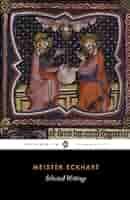Eckhart von Hochheim (c. 1260 – c. 1327/28), commonly known as Meister Eckhart, is a German theologian, philosopher, and mystic born near Gotha, in Thuringia. It seems he enjoyed a relatively successful academic life and was considered to be an able orator and preacher. In his distinguished career he became a Parisian Professor of Theology and took a leading pastoral and organizational role in the Dominican Order. He came into prominence during the Avignon Papacy. Enough of his work has been recovered for scholars to be to able to discern and explicate certain of his themes and concerns; these include the nature of God, The Trinity, the relationship of the human soul to God, and the processes inherent in these and other Christian concerns. Views on sin and redemption, Christ, and ethics are also expounded. The existing works are in the form of sermons, and fragments of a more substantial three-part work called the Opus tripartitum. Eckhart’s views may have teetered toward heresy at times, because he sought to reconcile traditional Christian belief with the transcendental metaphysics of Neoplatonism. There is no doubt this caused him a little trouble, though all the details are not clear.
Within popular spirituality he has acquired a status as a great mystic, though contemporary scholarship places him properly within the mediaeval scholastic and philosophical tradition. Though not a systematic philosopher, Eckhart’s insights and contributions remain a source of curiosity to modern readers both inside and outside of the academia.
Numerous books with his work have been published lately. Selective Writings has been translated by Oliver Davies and includes an introduction by him. The edition includes the Talks of Instruction, The Book of Divine Consolation, On the Noble Man and Selected German and Latin Sermons.
One of the reasons I picked this book is that I find the introduction by Oliver Davies very illuminating. He starts with an overview to Meister Eckhart’s life and explanations of his thoughts about Oneness, Creation, The Ground of the Soul, The Birth of God in the Soul, and Detachment. He further discusses his methods and the European intellectual tradition in regards to Eckhart’s work.
My favorite part is The Talks of Instruction because he explains his thought on true obedience, the most powerful prayer, the undetached people who are full of self-will, the value of renunciation, on detachment and possessing God, and how we should perform our works in the most rational way. He tells us to make a constant effort in spiritual progress and how temptation to sin always aids our progress; explains the virtue of the will and what to do if we cannot find God.
He continues by talking about sin, repentance; true confidence and hope; on the two kinds of certainty of eternal life, how to remain peaceful when confronted with oppression, how to enjoy food and cheerful company and he explains why God sometimes allows good people to be hindered. Meister Eckhart ends this book with thoughts on spiritual endeavor and how to find the right path.
In The Noble Man he explains that we possess in ourselves two natures, one that is body and the other spirit (similar to Theosophy which distinguishes between personality and individuality); he speaks of the nobility of the inner man, that is the spirit, and the worthlessness of the outer man, that is the flesh and that the seed of God is in us; he also points out that “it is in Oneness that God is found, and they who would find God must themselves become One.” And he emphasizes that we have to know ourselves in order to know God.
The German and Latin sermons are easy to read and cover different issues and passages from the Bible.
Statements from the German sermons that caught my attention included his recommendation to take note of our weaknesses and overcome them; that all the commandments of God proceed from love; that God is in all things, that he made all things and remained within them; that we should love our neighbors as ourselves; and that we should become free of ourselves and of all things. He tells us that our blessedness does not lie in our active doing, rather in our passive reception of God. His explanation in sermon 15 about Holy Trinity, that distinction within the Trinity comes from its unity, reminded me of the explanation of Elisabeth Haich in Initiation (page 244) about the triangle.
My favorite Latin sermon is the last one, a very short discourse about what we should bear in mind with respect to the words of prayer.
He repeats more than once that a relationship to the Good comes from within rather than without. He also rejects the importance of forms of worship and insists on an interior acceptance of self-love as a necessary precondition to the love of God and others.
One of my favorite Theosophists, Dr. Franz Hartmann, wrote a wonderful book, “Yoga and Christianity“, in which he argues that what has been taught in the Bhagavad Gītā, has been taught especially emphatically and convincingly by Meister Eckhart.
